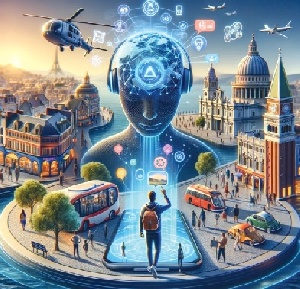
Artificial Intelligence Revolutionizes the Tourism Industry
The tourism industry is rapidly embracing artificial intelligence (AI) as a transformative force, leveraging its potential to enhance traditional practices and drive operational efficiency.
AI technologies are being integrated across various facets of tourism, from customer service to backend operations. According to a recent Forbes survey, the AI sector is projected to grow into a $15.7 trillion industry by 2030, with investments expected to hit approximately $500 billion by 2024.
One of AI’s biggest impacts lies in elevating customer experiences while streamlining business processes. What once seemed like futuristic innovation is now a reality—thanks to the synergy between AI and human expertise, dubbed the “Augmented Enterprise.” An MIT study highlights that companies combining AI with human talent outperform their peers by an astonishing 650%.
For example, conversational AI assistants powered by generative models are revolutionizing traveler interactions. These smart assistants provide instant support, manage reservations, and offer personalized travel advice—significantly reducing staff workload and boosting customer satisfaction.
Beyond customer service, AI optimizes core operational functions. Advanced algorithms analyze vast datasets to refine pricing strategies, predict demand trends, and maximize revenue while minimizing waste. Predictive maintenance, powered by AI, ensures that critical travel infrastructure and equipment remain in peak condition, preventing costly disruptions.
AI is also sparking innovation in travel services. Augmented reality-powered tour guides provide immersive, interactive experiences at historical sites, enriching visitors’ engagement. Meanwhile, AI-driven security systems enhance threat detection and streamline safety protocols, ensuring safer travel environments.
Looking ahead, AI promises even smarter, more personalized travel experiences. By leveraging advanced data analysis, AI anticipates traveler needs, transforming how people plan, book, and enjoy their journeys. AI-powered recommendation engines curate tailored itineraries and suggest attractions and dining options based on past preferences and real-time trends—saving travelers valuable time and enhancing overall enjoyment.
In transportation, AI improves efficiency by optimizing routes for public transit and individual travelers alike. Real-time navigation apps deliver traffic updates and suggest the fastest routes, helping reduce congestion and environmental impact.
Dynamic pricing models powered by AI analyze booking patterns, seasonal fluctuations, and competitor rates to offer flexible, competitive pricing that maximizes revenue for businesses while benefiting customers.
Furthermore, AI-driven automated booking systems streamline reservations for flights and hotels, managing high volumes simultaneously with instant confirmations—reducing human error and enhancing convenience.
As AI continues to evolve, its integration into the tourism sector will reshape the industry—making travel smarter, more personalized, and more efficient than ever before.





